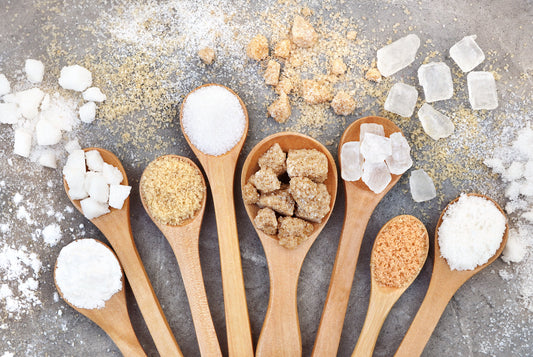Stevia is a zero-calorie sweetener that’s found in many low-calorie and sugar-free foods and beverages. While many people have turned to stevia and other sweeteners to reduce their sugar intake and help with weight loss, there’s still a lot we don’t know about these compounds.
For example, how long does stevia stay in your body? What happens once you eat it, and how is stevia processed in the body and removed from your system? Is it even safe to consume products with stevia every day, or are there long-term effects?
In this article, we’ll break down everything you need to know about stevia. If you don’t like some of the hard facts about stevia and its consequences, we’ll also introduce you to some healthy, natural, stevia alternatives that taste great and are better for you!
What is Stevia and How is it Used?
Stevia, scientifically known as Stevia rebaudiana, is a plant native to South America that has been used for centuries as a natural sweetener and medicinal herb. The leaves of the Stevia plant contain compounds called steviol glycosides, which are responsible for their intense sweetness.
These glycosides can be up to 300 times sweeter than sucrose (table sugar), making Stevia an attractive option for those looking to reduce their sugar intake without sacrificing sweetness. In recent years, Stevia has gained widespread popularity as a sugar substitute.
Stevia is used commercially in the production of many baked foods and diet sodas and is also available in tabletop form to be added to your food or drinks at home. Some people also cook and bake with stevia, using it as a low-calorie sugar replacement.
How Long Does Stevia Stay in Your Body?
So, how long does stevia stay in your body, and how is stevia processed in the body after it’s ingested? Let’s take a look at what happens after we eat or drink a product containing stevia.
How is Stevia Processed in the Body?
Upon consumption, the sweet steviol glycosides travel through the digestive system. As they encounter the acidic environment of the stomach, enzymes break down the glycosides into smaller molecules, including steviol.
Steviol is then absorbed in the small intestine and enters the bloodstream. Unlike traditional sugars, steviol is not metabolized for energy. Instead, it is filtered by the kidneys and excreted via urine.
How Long Does Stevia Stay in Your Body?
Exactly how long does stevia stay in your body? Generally, stevia components are detectable in urine within a few hours after consumption and can continue to be present for up to 24 hours or more.
It seems that almost all stevia is excreted within around 24 hours, but small amounts may linger. The time it takes to process stevia can depend on your metabolism, overall diet, hydration, and the amount of stevia you consume. How much stevia is too much? Find out in our in-depth guide!
The Effects of Stevia In the Body: Why You May Be Searching For a Safer, Natural Alternative
Stevia is found in so many of the food and beverage products around us, but that doesn’t mean it’s a healthy option. Serious concerns have been raised about the safety of stevia and some of the long and short-term side effects of stevia in the body.
So, what exactly are the effects of stevia in the body? Let’s dive into some of the health risks and controversies associated with stevia.
Potential Health Risks and Controversies
While Stevia is generally recognized as safe by the FDA, this wasn’t always the case. In fact, stevia was banned in the US for several years. Why was stevia banned? There were serious safety concerns, as scientists had found links between stevia and reproductive health and even certain cancers.
Some forms of stevia are still banned, including whole leaves and crude stevia extract. In Europe, the use of stevia is highly restricted due to safety concerns.
As well as reproductive issues and links with cancer, stevia can cause gastrointestinal issues like bloating and stomach cramps. Other sweeteners, including sucralose and aspartame, can also cause intolerance to artificial sweeteners symptoms, as our bodies aren’t used to processing these compounds.
Does stevia cause weight gain? That’s another big problem with this sweetener! Many people take stevia to control their sugar intake and help them lose weight, without realizing that it could be having the opposite effect.
Recent research found that sweeteners can increase BMI and waist circumference, which is not good news for anyone hoping to use stevia for weight loss. As you can see, these effects of stevia in the body aren’t ideal, which leads many people to search for healthier, safer options.
The Bitter Aftertaste: Why Some People Dislike Stevia
Something else that’s worth mentioning is the “distinctive” stevia taste. Many people find the taste of stevia to be deeply unpleasant, bordering on intolerable. It can leave behind an extremely bitter aftertaste that lingers on your tongue for hours.
In fact, the bitter aftertaste of stevia is so intense that it often has to be masked. Many commercial food and beverage products containing stevia will also add other artificial flavorings to help cover up stevia’s aftertaste.
Can Sweet Proteins Be the Alternative to Stevia You’ve Been Missing?
As you can see, there’s a lot to be concerned about when it comes to the effect of stevia in the body. Unfortunately, many other artificial sweeteners and sugar substitutes bring these same concerns. Luckily, there’s a healthier alternative that’s just started to hit the shelves: Sweet proteins!
What Are Sweet Proteins?
Sweet proteins are a class of natural compounds often found in tropical fruits. They can be a staggering 5,000 times sweeter than sugar and can be added to foods without affecting the calorie or sugar content.
How are sweet proteins made? Sweet proteins can be made using a natural fermentation process, similar to how beer, cheese, and wine are made. Compared to sugar farming, which requires huge amounts of land and water, sweet proteins as a sugar substitute is much more environmentally friendly.
Why They Don't Share the Same Concerns as Stevia
Because sweet proteins are natural compounds that are already found in many fruits, they don’t share the health risks that come with artificial sweeteners. In fact, there are actually lots of benefits of sweet proteins - they are anti-inflammatory and contain important antioxidants.
Sweet proteins don’t affect blood sugar levels since they are not metabolized for energy. This makes them a great choice for anyone seeking to manage their blood sugar, including diabetics.
Taste Comparison: Stevia vs Sweet Proteins
How long does stevia stay in your body? While the compounds themselves might be excreted within 24 hours, the taste of stevia can haunt you for months! One of the best things about sweet proteins is that they don’t come with stevia’s subjectively, intensely bitter aftertaste.
This also means that products containing sweet proteins don’t need to use artificial flavors or added chemicals to mask the aftertaste - it’s much easier to find clean, natural foods and drinks containing sweet proteins compared to stevia.
How to Make the Switch from Stevia to Sweet Proteins
When you compare the health issues associated with stevia with the health benefits that sweet proteins can offer, making the switch to sweet proteins is the obvious choice. So, how do you do it? Here’s what you need to know about replacing sweeteners with naturally sweet proteins.
Finding Products That Utilize Sweet Proteins
At Oobli, we’ve made it our mission to harness the power of sweet proteins and create exciting new versions of your favorite treats, without the unwanted effects of sweeteners. Our guilt-free, refreshing low-sugar tea and decadent chocolate bars are exactly what you’ve been waiting for!
Available in different flavors, and made with only a few ingredients, our sweet iced teas are one of the best low-sugar drinks you’ll find, and the perfect low-calorie drinks without aspartame or other sweeteners. With only 7g of sugar in each 16oz can, you’ll love this guilt-free thirst quencher!
To satisfy your sweet tooth, our creamy dark chocolate bars are a low-sugar option that will have you coming back for more. High in fiber, vegan, and keto-friendly, our bars contain only 6 ingredients, and nothing you can’t pronounce!
How to Use Sweet Proteins in Cooking and Baking
At the moment, it’s not easy to find sweet proteins that you can use in cooking and baking at home. However, as these powerfully sweet morsels grow in popularity and the world comes to love them as much as we do, sweet proteins will be on shelves everywhere.
For now, start by enjoying ready-made sweet protein treats from Oobli - we’ve already done the hard work for you!
Closing Thoughts on How Long Stevia Stays in Your Body
So, how long does stevia stay in your body? While most stevia is filtered through your kidneys and excreted via urine within 24 hours of consumption, the health effects of stevia can linger for far longer.
Stevia has been linked with reproductive issues, headaches, intestinal problems, and even certain types of cancer. While stevia extract is no longer banned by the FDA, its use is still regulated, with crude stevia and stevia leaves both still banned in the US.
The best way to avoid the potential health risks associated with stevia and other sugar substitutes is to leave them behind for something healthier - sweet proteins! These naturally-derived compounds pack a real punch and are much better for you than their artificial counterparts.
Fall in love with a whole new way to enjoy your favorite treats, guilt-free. Try naturally-sweetened, low-sugar iced teas and chocolates from Oobli today!




